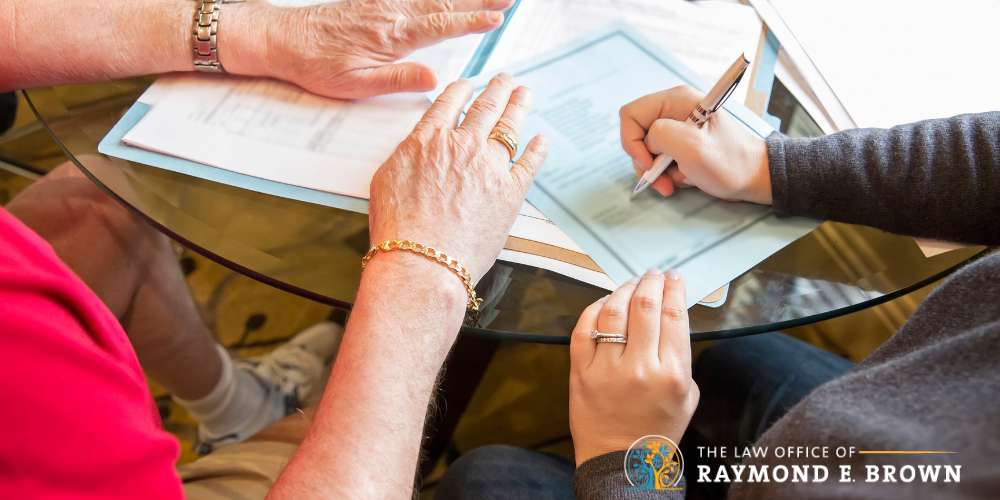A question we get quite a lot here at The Law Office of Raymond E. Brown is “Do I need a will if I have no assets?” The truth is, very few people actually have no assets to their name. And while it might seem unnecessary for those who believe they have very few valuable assets, writing a last will and testament can still be incredibly important for a number of other reasons.
Remember, estate planning is not solely about the distribution of assets upon your death; it’s about making thoughtful decisions about a variety of matters in order to provide clarity and guidance to your loved ones when you are no longer there to do so yourself.
If you’re interested in creating a will in Maryland, Annapolis estate planning attorney Raymond E. Brown is here to help guide you through the process. To get started, simply call (443) 554-9944 or reach out online today.
I Don’t Have Much… Do I Really Need a Long, Complex Will?
Most people assume that a will is only necessary for those with substantial wealth and numerous assets. This is not the case. Even those with relatively few assets can benefit significantly from creating a will – and it doesn’t have to be long and complex, either. Your will is tailored to reflect the extent of your assets and wishes, no matter how few or how many you may have.
At the end of the day, it isn’t about how much “stuff” you own, but about ensuring your intentions are well documented and carried out the way you want following your passing. Drafting a will can also help provide peace of mind for the family members you leave behind, as they won’t be left trying to figure out what you would have wanted during what is likely already a stressful time. So, even if your estate seems modest, drafting a will is still a very wise choice.
Let me give you an example. A typical client, let’s call her Elise, comes in and says, “I don’t need anything fancy because I don’t have much.” But based on statistics, we know that isn’t true. So, we develop a Will that protects not only what she mentioned but more. Two years later, Elise returned to tell us she had started a non-profit with her son and wanted to ensure it could be passed on to him. I was pleased to inform her she was already covered! And about those “no assets” – it turns out Elise was a beloved baker within her family. Her relatives cherished – almost fought over – three baking books filled with her notes, and they often baked together using her recipes during her lifetime.

Does Everyone Need a Will?
Wills certainly aren’t mandatory, but everyone should create a will regardless of the size of their estate. Aside from just distributing assets and property, wills serve a variety of purposes. For example, if you have minor children, you can appoint guardians for them in your will in the unfortunate event that you pass before they reach adulthood.
Not only that, but a will also allows you to make specific funeral arrangements for yourself, designate caretakers for pets, outline your wishes for digital assets and health care decisions, and much more, providing comprehensive control over all of your affairs and peace of mind for the loved ones you leave behind.
If You Don’t Have a Will, Where Does Your Money Go?
If you don’t have a will when you pass away, your money and assets will be distributed according to probate law, specifically the intestate laws of the state in which you reside. When this happens, the probate court will step in to determine how your estate is divided among heirs.
According to Maryland’s intestacy laws, any property left behind will be distributed to the decedent’s closest living relatives. This includes surviving spouses (for those who are married) and any children they may have had, biological or adopted. If no spouse or children are left behind, property may be distributed to parents, siblings, or more distant relatives in a specific order.
In the case that no living blood relatives (or stepchildren) can be found, Maryland courts dictate that the estate may fall in the hands of the Board of Education in whichever jurisdiction the decedent lived.
As you can see, if you die without creating a will, you have no control over where your property goes, and the court’s decisions may not align with your wishes.

8 Reasons to Make a Will
We’ve only briefly touched on some of the benefits that a will can offer for both the person making it and the loved ones they leave behind. Below, we’ll go into more detail regarding these benefits as we provide 8 compelling reasons why everyone should consider making a will.
Control Over Asset Distribution
Creating a will allows you to maintain control over the distribution of your assets, regardless of how few or how many you have. This ensures that everything you have goes exactly where you want it to. By clearly outlining your wishes, you can designate specific beneficiaries for your personal property, savings, and any meaningful possessions you may have.
Appointment of Guardians for Minor Children
No one wants to think about the possibility of passing away before seeing their children grow up, but it is important to plan for in case this becomes a reality. Creating a will allows you to appoint a guardian (or guardians) for your minor children, ensuring they are well-cared for in the event of your passing. This may be a sibling, close friend, or anyone who you trust to raise your child if you cannot.
Even if you don’t have children, a will is also beneficial for designating caretakers for your pets, ensuring they are placed in a loving home and receive the care and attention they deserve.
Reducing Family Conflicts
When your intentions are explicitly written in a legally binding document, it minimizes the chances of misunderstandings and disputes among family members and loved ones. This clarity can help prevent disagreements and legal battles concerning your assets, providing a smoother and more harmonious process during what is likely already a difficult time.
Naming an Executor
Creating a will also allows you to grant authority to someone you trust to manage and settle your estate after you pass. The executor, also known as the personal representative, plays a key role in ensuring that your assets are distributed according to your wishes, debts and taxes are paid, and any legal matters are handled efficiently.
The duties of a will executor require them to manage your estate according to your preferences and faithfully execute your directions. This appointment not only simplifies the legal process but also provides reassurance that your estate is in capable hands and that your final wishes are honored.
Managing Digital Assets
In today’s day and age, incorporating digital assets into an estate plan is commonplace. Creating a will provides an opportunity to specify how these digital assets—such as social media accounts, online banking, email accounts, and digital photo libraries—should be handled and managed after you pass. By including these assets in your will, you can designate who will have access to them and how they should be managed or disposed of.
In a time where much of our personal and financial information is stored online, this is becoming increasingly important. Without clear instructions, these digital assets might be overlooked or mishandled, potentially leading to the loss of valuable digital content or disruption in the management of online financial services.
Providing for Charitable Donations
Whatever assets you may have to your name, a last will allows you to decide where or to whom you wish them to be distributed upon your passing. This includes charitable causes that may be close to your heart. By specifying in your will that certain assets or a designated portion of your estate should be donated to charity, you ensure that your philanthropic goals are met after your passing.
Without a will, there is no assurance that your estate will be distributed according to your wishes. Instead, it would be subject to the default rules of intestate succession, which typically prioritize immediate family members and do not account for charitable donations.
Clarifying Your Healthcare Decisions
A living will, also known as an advance directive, complements a traditional will by documenting your preferences concerning healthcare if you become unable to express them yourself. This type of will specifies what medical actions should be taken in the event of incapacitation, such as life support and resuscitation efforts. By creating a living will, you take the burden off family members from making these difficult medical decisions as well as protect your autonomy by ensuring that your healthcare wishes are executed exactly as you intend.
Planning Your Own Funeral
If you have any specific funeral wishes for yourself, such as whether you’d like to be buried or cremated, a will can ensure these wishes are clearly outlined and respected. By documenting these preferences in your will, you provide clear guidance to your loved ones, relieving them of the burden of making these decisions during a time of grief. This not only ensures that your final rites reflect your personal beliefs and wishes but also helps to prevent any potential conflicts among family members over what they might think you would have wanted.

Where To Start
If you’re considering drafting a will but aren’t sure where to start, the first step is to familiarize yourself with the state laws that govern wills in your area. Understanding your state’s requirements for what makes a will legally binding is crucial. Typically, this includes stipulations about the age and mental capacity of the person creating the will (the testator), as well as how the will must be witnessed and signed. For example, Maryland requires the testator to be of sound mind and that at least two impartial witnesses sign the will, confirming they saw you sign it in their presence.
Since these laws can be complex and vary significantly from state to state, it’s wise to consult with a lawyer in your area who specializes in estate planning to help you write your will. An experienced estate planning lawyer can help ensure that your will is properly written, reflects your wishes accurately and clearly, and stands up in court, should it ever be contested.
Call Annapolis, Maryland Estate Planning Attorney Raymond E. Brown Today
If you haven’t yet created a will and/or have concerns about whether or not you can even benefit from one, it’s important to talk to someone who can answer your questions and provide knowledgeable advice and guidance for the future of your estate. Raymond E. Brown, a seasoned Annapolis estate planning attorney, is here to provide you with the assistance you need to determine the best course of action based on your unique circumstances.
Don’t leave your estate planning to chance. Reach out to our experienced attorneys at The Law Office of Raymond E. Brown today and take the first step towards ensuring your wishes are accurately and effectively carried out. Give us a call at (443) 554-9944 or complete our online intake form to get started.